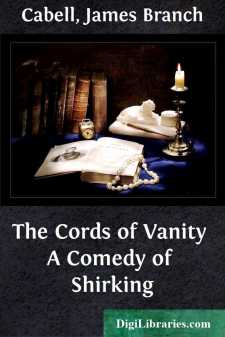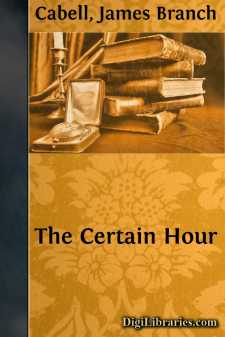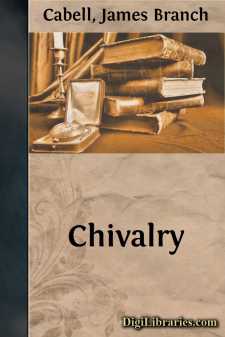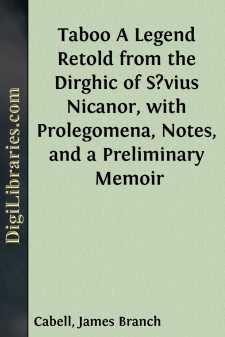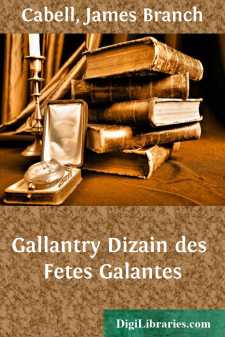Categories
- Antiques & Collectibles 13
- Architecture 36
- Art 48
- Bibles 22
- Biography & Autobiography 813
- Body, Mind & Spirit 142
- Business & Economics 28
- Children's Books 15
- Children's Fiction 12
- Computers 4
- Cooking 94
- Crafts & Hobbies 4
- Drama 346
- Education 46
- Family & Relationships 57
- Fiction 11828
- Games 19
- Gardening 17
- Health & Fitness 34
- History 1377
- House & Home 1
- Humor 147
- Juvenile Fiction 1873
- Juvenile Nonfiction 202
- Language Arts & Disciplines 88
- Law 16
- Literary Collections 686
- Literary Criticism 179
- Mathematics 13
- Medical 41
- Music 40
- Nature 179
- Non-Classifiable 1768
- Performing Arts 7
- Periodicals 1453
- Philosophy 64
- Photography 2
- Poetry 896
- Political Science 203
- Psychology 42
- Reference 154
- Religion 513
- Science 126
- Self-Help 84
- Social Science 81
- Sports & Recreation 34
- Study Aids 3
- Technology & Engineering 59
- Transportation 23
- Travel 463
- True Crime 29
James Branch Cabell
James Branch Cabell was an American author known for his fantasy and satirical works, particularly the "Biography of the Life of Manuel" series. His most famous novel, "Jurgen, A Comedy of Justice," published in 1919, was subject to an obscenity trial that eventually boosted his literary reputation. Cabell's writing, characterized by its wit and irony, often explored themes of idealism, heroism, and the human condition.
Author's Books:
Sort by:
AN INTRODUCTION by Wilson Follett Mr. Cabell, in making ready this second or intended edition of THE CORDS OF VANITY, performs an act of reclamation which is at the same time an act of fresh creation. For the purely reclamatory aspect of what he has done, his reward (so far as that can consist in anything save the doing) must come from insignificantly few directions; so few indeed that he, with a wrily...
more...
PART ONE - PROPINQUITY "A singer, eh?вЦ Well, well! but when he sings Take jealous heed lest idiosyncrasies Entinge and taint too deep his melodies; See that his lute has no discordant strings To harrow us; and let his vaporings Be all of virtue and its victories, And of man's best and noblest qualities, And scenery, and flowers, and similar things....
more...
I This is the story of Margaret Hugonin and of the Eagle. And with yourpermission, we will for the present defer all consideration of thebird, and devote our unqualified attention to Margaret. I have always esteemed Margaret the obvious, sensible, mostappropriate name that can be bestowed upon a girl-child, for it is aname that fits a woman--any woman--as neatly as her proper size ingloves. Yes, the...
more...
Prudence urges me here to forestall detection, by conceding that this brief play has no pretension to "literary" quality. It is a piece in its inception designed for, and in its making swayed by, the requirements of the little theatre stage. The one virtue which anybody anywhere could claim for The Jewel Merchants is the fact that it "acts" easily and rather effectively. And candor...
more...
AUCTORIAL INDUCTION WHICH (AFTER SOME BRIEF DISCOURSE OF FIRES AND FRYING-PANS) ELUCIDATES THE INEXPEDIENCY OF PUBLISHING THIS BOOK, AS WELL AS THE NECESSITY OF WRITING IT: AND THENCE PASSES TO A MODEST DEFENSE OF MORE VITAL THEMES. The desire to write perfectly of beautiful happenings is, as the saying runs, old as the hills—and as immortal. Questionless, there was many a serviceable brick wasted in...
more...
I THE STORY OF THE SESTINA “Armatz de fust e de fer e d’acier, Mos ostal seran bosc, fregz, e semdier, E mas cansos sestinas e descortz, E mantenrai los frevols contra ’ls fortz.”THE FIRST NOVEL.—ALIANORA OF PROVENCE, COMING IN DISGUISE AND IN ADVERSITY TO A CERTAIN CLERK, IS BY HIM CONDUCTED ACROSS A HOSTILE COUNTRY; AND IN THAT TROUBLED JOURNEY ARE MADE MANIFEST TO EACH THE SNARES WHICH HAD...
more...
MEMOIR OF SÆVIUS NICANOR Saevius Nicanor Marci libertus negabit"She went to the tailor'sTo buy him a coat;When she came backHe was riding the goat." Sævius Nicanor, one of the earliest of the Grammarians, says Suetonius, first acquired fame and reputation by his teaching; and, besides, made commentaries, the greater part of which, however, were said to have been borrowed. He also wrote a...
more...
INTRODUCTION These paragraphs, dignified by the revised edition of Gallantry and spuriously designated An Introduction, are nothing more than a series of notes and haphazard discoveries in preparation of a thesis. That thesis, if it is ever written, will bear a title something academically like The Psychogenesis of a Poet; or Cabell the Masquerader. For it is in this guise—sometimes self-declared,...
more...
"Nescio quid certè est: et Hylax in limine latrat." A Foreword: Which Asserts Nothing. In Continental periodicals not more than a dozen articles in all would seem to have given accounts or partial translations of the Jurgen legends. No thorough investigation of this epos can be said to have appeared in print, anywhere, prior to the publication, in 1913, of the monumental Synopses of Aryan...
more...
ROBERT GAMBLE CABELL I "He loved chivalrye,Trouthe and honour, fredom and curteisye.And of his port as meek as is a mayde,He never yet no vileinye ne saydeIn al his lyf, unto no maner wight.He was a verray parfit gentil knyght." Introduction The Cabell case belongs to comedy in the grand manner. For fifteen years or more the man wrote and wrote—good stuff, sound stuff, extremely original...
more...


